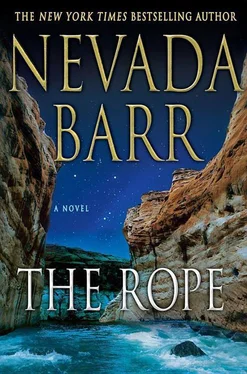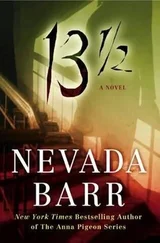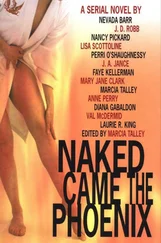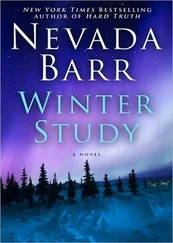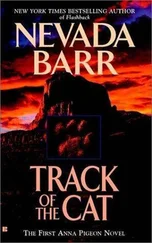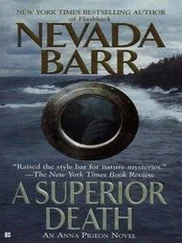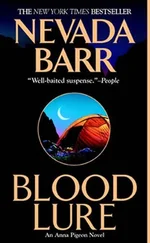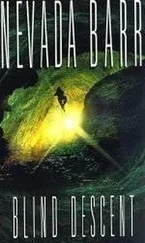Anna had not been weeping the night he came to the solution hole. She had been lying under the sand, waiting, like a trapdoor spider.
Anna said nothing.
There were two phones in Dangling Rope, one in the ranger station on the dock and the other in the small convenience store run by the park concessionaire. Since the Rope didn’t have its own district ranger, as the senior NPS employee, Jenny had the key to the ranger station. Jim thought he should keep it because he was law enforcement.
When he grumbled about it Jenny had said sweetly, “Then next time you give Steve the blow job.”
Anna had thought it funny. Gil, Dennis, Regis—the males—were not laughing. They were thinking maybe it was true. Jenny winked at Anna and rolled her eyes.
That was Anna’s third or fourth day at the Rope. Cocooned in her grief, she hadn’t put herself out to get to know her fellows, not even Jenny. That wink and eye roll surprised her. Jenny had seen her. Being unseen was one of Anna’s skills. During rehearsals, stage managers were visible. During the running of the show, they were not. Anna dressed in black, as did the crew, so if the audience accidentally caught a glimpse of her it would make little impression. She cultivated a soft low voice so backstage noise wouldn’t compete with the show onstage. She wore soft-soled shoes and moved quietly. She did not bump into things or set curtains moving as she passed through. She could see well in the dark.
Before she lost Zach, Anna used this learned invisibility only professionally. Jenny’s wink let her know she had been trying to disappear during the light of day and it hadn’t worked, at least not on Jenny.
That had been less than three weeks before. The jar had turned time on its end, and it seemed a story from when Anna was much younger.
As soon as the dock settled down for the evening, Anna got the ranger station key from Jenny and went down the hill to the lake. She needed her psychiatrist. More than that, she needed her sister. Molly had been so present during her days in the jar that, as she inserted the key and let herself into the cramped office, she reminded herself Molly had been present only in her mind. Her tale would be a shock to her.
Molly would go into one of her icy rages, the kind where her mind glittered like crystal and her eyes could slay at a glance. Anna needed that, too, needed someone to be furious for her, rage against the withering impotence of knowing life was very, very unfair, and there was not one goddamned thing you could do about it.
Having locked the door behind her, she slipped into the padded swivel chair in front of the desk, a narrow built-in behind a half-wall that kept visitors from wandering into the working portion of the office.
There was both an overhead light and a desk lamp. Anna left them dark. Not only did she feel at home without light, she didn’t want visitors trotting down to borrow a cup of sugar.
Finally alone, the last rays of the day making the dust motes sparkle and dance in the dim office, Anna realized how tired she was. After Regis had been rescued from the solution hole, Steve ordered her to the Bullfrog clinic. The nurse practitioner—a competent woman named Beatrice—wanted her to go to the hospital in Wahweap or, failing that, stay overnight in Bullfrog for observation. Anna refused, arguing her injuries were old news. If the bang on the head and dislocation of her shoulder were going to kill her, she’d already be dead.
Never again would she allow herself to be trapped and observed by strangers as she slept. After signing release forms, Beatrice let her go. The woman was so affronted by her refusal to see sense she’d actually said, “If you have problems with the concussion, let it be on your head.”
By the time she’d gotten a boat ride back to Dangling Rope it had been after five. She had forgotten to eat. Now she was out of fuel, running on empty, and not running very fast. A few glasses of wine backed by a Xanax and sixteen hours in bed looked like her very own Eden. Still, she picked up the phone and dialed the many numbers needed to make a credit card call to New York.
“It’s me, Anna,” she said when she heard Molly’s “hello.” At the sound of her sister’s voice, tears she had no idea were waiting gushed from her eyes. With an effort, Anna kept them from her voice.
“Well, well,” her sister said. “Did you have to ride a yak to the nearest village where they had running water and AT&T?”
As was Molly’s habit—both by training and inclination—she listened without interrupting while Anna told her tale of abduction, assault, and imprisonment. Trusting her sister absolutely, as she had done since she could remember and probably from the moment her mother brought her home from the hospital and laid her in six-year-old Molly’s arms, Anna left nothing out: the drugged water, the carving on her thigh, being stripped, her nude body posed—all of it. Twice she heard the familiar metallic rasp followed by a short sharp intake of breath as her sister lit and smoked two Camel unfiltered cigarettes.
Anna was glad she could end the story with the odiferous heroics of Buddy. Neither she nor the little skunk knew the man in the dark was Regis Candor and not one of the young murderers and would-be rapists, so Buddy got full credit for saving her life.
That he had saved her in other ways she didn’t bother to voice—not at twenty-five cents a minute. Molly would know. The healing power of friendship, the value of having someone to care for, to give and receive love, were things her sister often said she wished she could dole out in pill form.
The only part of the story Anna kept back was that not only had Molly’s voice been with her in the jar, but it had pulled her back from the edge. Much as Anna loved and trusted her older sister, there was no sense giving her a big head. As a doctor and a New Yorker, Molly had sufficient arrogance to get her through the day.
Finishing her story, Anna brought Molly to the present moment: sitting in a small dusty ranger station, sun relinquishing its light to the first stars, absolute quiet a palpable thing. Over the phone line, from three stories above Seventy-seventh, off Fifth Avenue, Anna listened to the ululations of sirens, the sound track of cities.
For a long intake of breath Molly said nothing. Then she gave her professional summing up: “Yikes.” Another long breath came and went. The slow response to a story full of danger and drama didn’t offend Anna. This was how Molly designated levels of importance. Shallow thoughts brought quick rejoinders; serious matters deserved serious attention.
“This Regis guy stinks to high heaven,” Molly said finally.
“Even without Buddy’s ministrations,” Anna agreed.
“But it was not he who struck the girl you unburied, or chased you and, presumably, knocked you unconscious, stripped you, and rolled you into the pit.”
“Right,” Anna said. “As far as I know, Regis wasn’t within miles of me that afternoon.”
“Easy enough to check,” Molly said.
It was easy to check. Anna could find out. Until that moment, pursuing justice on her own behalf hadn’t crossed her mind. There were professionals for that. Vigilante justice had struck Anna as an oxymoron. Until now.
“You’re right,” Anna said firmly.
“What? No you don’t. I am most assuredly not right if you’re thinking two of my rights are your permission to do a big fat wrong. What are you thinking, Anna?” Molly demanded. “Your voice has that terrifying ‘fools rush in’ ring to it.”
“It’s better than feeling helpless,” Anna countered.
“It’s not better than feeling dead,” her sister snapped.
Читать дальше
